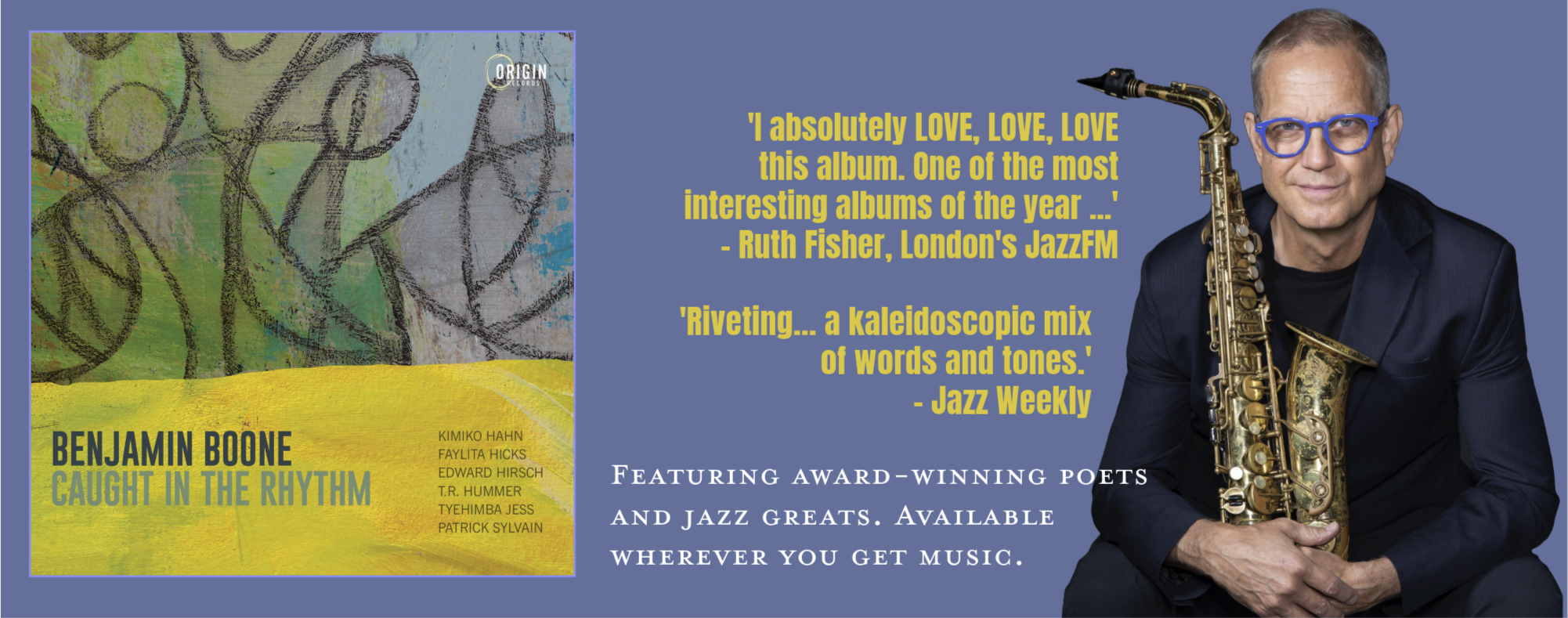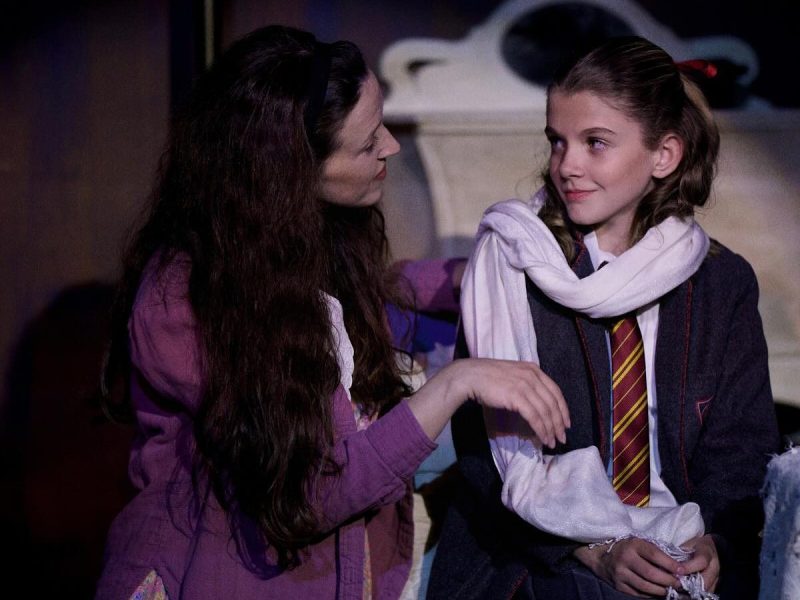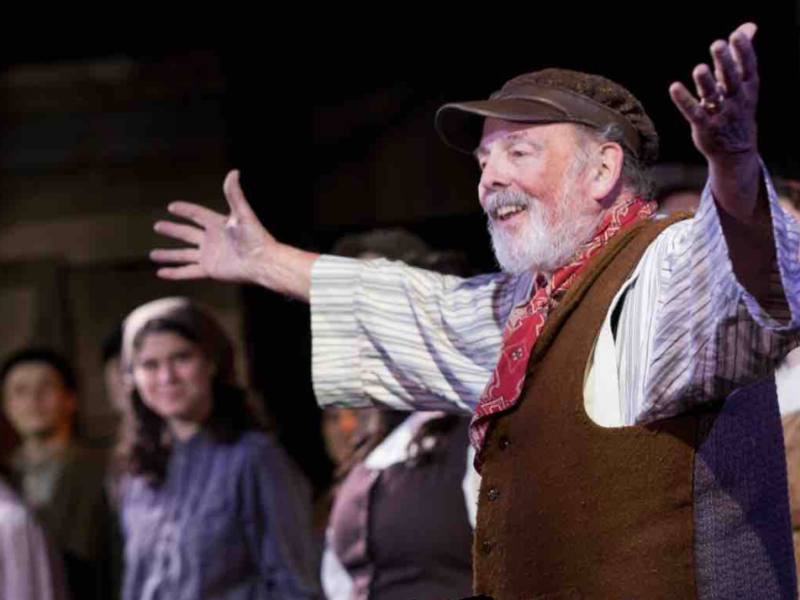A doctor and a dream: For Don Gaede, anything is possible in ‘La Mancha’
For the next couple of months, during the run of the Good Company Players production of “The Man of La Mancha,” Don Gaede has an interesting work schedule: Half the week, he’s a specialist in vascular medicine. The other half, he’s a singing innkeeper.
See what can happen, kids, when you’re good at both science and the arts?
Pictured above: Don Gaede, left, and Chris Mangels (as Don Quixote) in ‘Man of La Mancha.’ Photo: Good Company Players
Fresno opera lovers have long known Gaede as one of the “singing doctors” featured annually in the California Opera festival. Now he can be seen at Roger Rocka’s Dinner Theatre as an ensemble member — and understudy for Don Quixote — in a show that he has long loved. The production opens tonight (Thursday, Sept. 19) and continues through Nov. 10. I caught up with Dr. Gaede for an interview.
Q: You play the Innkeeper in “Man of La Mancha.” What kind of guy is he? Would he feel most comfortable working behind the front desk of a Motel 6, an airport Hilton or a Ritz-Carlton?
A: I think the “friendly innkeeper” is a Motel 6-ish guy. He simply likes people, no matter what their stripe. Our director, Julie Lucido, told me she wants me to create a distinct character who even walks a bit differently from my other character, “the governor.”
So I asked a couple of my friendliest friends to read some of his lines for me. I ultimately decided to mimic a friend who always greets me with a bear hug, and has a wonderful gift for making everyone feel right at home. He’s a drip irrigation salesman, but I think he’d make a great innkeeper, too.
Q: One fascinating fact about you is that you are a physician and an opera singer. In fact, many opera fans go to your “Doctors in Concert” annual fundraising event held as part of the California Opera festival. Tell us a little bit about yourself and how you ended up with both a great voice and the ability to write prescriptions.
A: I can’t take too much credit for my voice—I was simply born with an ability to sing pretty well. After my high school choir director assigned me the role of the judge in Gilbert and Sullivan’s operetta “Trial by Jury,” my opera “career” was launched.
Dan Pessano was the drama teacher at Roosevelt High School while I attended there. Unfortunately, I never took any classes with him, but he did give some good (if unheeded) advice. I was chosen by my graduating class to sing a song at our baccalaureate service. The class leaders specifically requested that I sing “The Impossible Dream,” but my choir teacher nixed that idea. He insisted that I instead sing one of his old favorites, which no one had ever heard of.
Just before the program was to begin, Pessano came up to me and suggested that it would look really great if I took the microphone out of its stand and crossed the stage a time or two while I sang my song. Well, to me, that recommendation was absolutely and completely a non-starter. I sang the entire song with arms straight and rigid, sweaty hands clasped tightly together, belting out “Courage to Be, God Give to Me!”
That same choir director did offer me some sage advice, though. He took me aside one day and said, “Don, you’ve got a really fine voice, and you could have a career in music if you wanted to. But I know you’re also thinking about medical school. Here’s my advice to you: Go to medical school, become a doctor, but make music an avocation — not a vocation — like I did.”
So I followed that advice, and enjoyed a successful medical career while doing music on the side. It’s been a lot of fun. But every once in a while, I stop and fantasize — what might my life have been like if I had taken the other path and devoted all my soul and energy into music?
The Munro Review has no paywall but is financially supported by readers who believe in its non-profit mission of bringing professional arts journalism to the central San Joaquin Valley. You can help by signing up for a monthly recurring paid membership or make a one-time donation of as little as $3. All memberships and donations are tax-deductible.
Q: Do you think being able to sing opera has made you a better doctor? And vice versa?
A: The doctor/opera singer connection has come in handy several times. In Fresno Grand Opera’s production of Gianni Schicchi, I sang the role of the doctor who lets everyone know he was trained at the University of Bologna and has never, ever lost a patient. More recently I sang the part of the dottore in California Opera’s “La Traviata.” For my props, I borrowed a 100-year-old doctor bag from our Fresno-Madera Medical Society and filled it with patent medicine bottles that came from my grandfather.
Q: A two-month run of a musical is a big commitment. You obviously really wanted to be in this particular show. Why?
A: I think it might have been a sign from God. On one particular day about six months ago, two different people told me, “Hey Don, Roger Rocka’s is going to do ‘Man of La Mancha’ — you really should audition.” That coincided with me cutting my office hours to 2½ days per week (I’ve limited my practice to just vascular medicine). That sealed the deal. I finally have the time and energy to do something I’ve wanted to do for a long time — be in a show at Roger Rocka’s. And not just any show — it’s one of my all-time favorites. I decided to audition.
Yes the two-month run is long, but I was always a bit frustrated when I would rehearse an operatic role for months, only to have it end after just two performances. Now I’ll have plenty of time to really hone my role and flesh out my characters.
 Good Company Players
Good Company Players Amalie Larsen, center, is Dulcinea in ‘Man of La Mancha.’
Q: True-confession time: Do you sing “The Impossible Dream” in the shower?
A: Yes, I do sing The Impossible Dream in the shower, in the car, and in pedestrian tunnels — where the acoustics are really amazing. During our show, every time I hear Chris Mangels sing the song — wonderfully, I must add — I am transported and inspired.
Q: Anything special you can tell us about this production? What has Lucido been up to?
Everyone told me that Julie was a really good director, and now I’m a believer too. Her passion for this production is quite obvious and contagious. Early this summer, she sent out numerous resources to help us understand the historical context of the “Golden Age” of Spanish literature, art, and dramatic theater in the 16th and 17th centuries, during which time Cervantes wrote his great novel, “Don Quixote.” Julie has incorporated several visual and dramatic elements of that era into our production.
“Man of La Mancha” is a play within a play—more literally, a play within a prison. We prisoners never exit the stage, so we never stop “acting.” Julie predicted that if we play our prisoner roles well, we will be emotionally exhausted by the end of the show. She was right.
The musical has both comedic and tragic elements, and a finale that (we hope) will leave the audience with renewed hope and inspiration.
Q: Do you recall your first exposure to the material — was it on stage, or at the movies?
A: Years ago, I read the majority of Cervantes’ novel (in English, of course). With Julie’s encouragement, I’ve been reading it again to gain insights into my character. I’ve been surprised at how faithful the script is to the original novel. I’m inspired by the fact that the book is considered by many to be not only the first novel ever written, but also the best novel ever written.
Q: You’re also the understudy for Don Quixote. Have you ever played the role before?
A: I’ve never played the role of Don Quixote, but have certainly fantasized about doing so.
We understudies have one night during rehearsals to perform our roles with the other actors. When my night came up, I was pretty nervous, but excited too. To my surprise, once the performance started, I let myself relax and “become” Cervantes and Don Quixote. It honestly felt as though I was on some sort of Disney fantasy ride through the land of La Mancha — definitely an E ticket ride, and well worth the price of admission.
People tell me I look a bit like Quixote, and I confess that sometimes I think like him, too. I honestly believe that you have to be a little crazy if you’re going to live out your full potential as a human being. You have to do things even though half of your brain is screaming “STOP!!!” You go ahead and do it anyway, and find out that you weren’t so crazy after all. You find you now have the courage to go on to do other “crazy” things.
When all is said and done, Quixote says it best. In answer to Aldonza’s question “Why do you do these things?” Quixote replies, “I wish to add some measure of grace to the world.” That is my wish as well.









